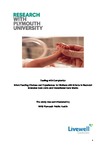Dealing with Complexity: Infant Feeding Choices and Experiences for Mothers with Infants in Neonatal Intensive Care Units and Transitional Care Wards
| dc.contributor.author | Stenhouse, E | |
| dc.contributor.author | Letherby, G | |
| dc.contributor.author | Bendall, Alison | |
| dc.contributor.author | Hopper, Heather | |
| dc.contributor.author | Nichols, G | |
| dc.contributor.author | Maxwell, N | |
| dc.contributor.other | NHS Plymouth Public Health | |
| dc.date.accessioned | 2018-03-13T10:51:42Z | |
| dc.date.available | 2018-03-13T10:51:42Z | |
| dc.date.issued | 2017-09-01 | |
| dc.identifier.isbn | 9781841024271 | |
| dc.identifier.uri | http://hdl.handle.net/10026.1/11076 | |
| dc.description.abstract |
EXECUTIVE SUMMARY The central aim of the research on which this document reports was: To explore the knowledge, perceptions and experiences of infant feeding of mothers with infants in neonatal intensive care units (NICU) and transitional care wards (TCW) and the support these mothers receive from healthcare professionals and significant others with the aim of contributing to further support of mothers, significant others and healthcare professionals in the future. The objectives were: 1. To explore mothers’ with infants in NICU knowledge and understanding of infant, feeding and how this influences feeding choices. 2. To gain an understanding of mothers experiences of infant feeding, 3. To investigate the challenges of infant feeding in NICU. 4. To explore the significance of their self-identity and perception as ‘good’ or ‘not so good’ mothers in relation to this choice. 5. To ascertain the support women receive from healthcare professionals and significant others. 6. To identify further research needs, develop service provision and inform practice and policy. Background to the study is supported by a review of the clinical and sociologically relevant literature and brief detail on a previous related study (Stenhouse and Letherby 2013) which focused on the experience of mothers’ whose pregnancies were complicated by diabetes. A mixed method ethnographic approach was adopted: • Observations in the NICU and TCW were undertaken (alongside interviewing) amounting to approximately six hours. • One-to-one and dyad/group interviewing were undertaken with mothers and some of their partners. • Questionnaires (consisting of 10 questions, some of which were open to allow more respondent input) were distributed to all healthcare professionals working in NICU and TCW. An audit involving a systematic and independent examination of maternal and infant notes was undertaken at the same time as the primary data was collected. DATA AND DISCUSSION The Audit: This section provides a snapshot of infant feeding and expression of breastmilk from a cohort of mothers and babies who had previously been cared for in NICU, TCW or both. Appendix IV is a copy of a poster presented as part of the Medical Training Special Studies Unit. Interview and Questionnaire Data: This section reports on data collected from women, significant others and healthcare professionals and includes detailed reference to the significance of ‘The Journey’, the mixed experience of ‘Skills and Support’ and the experiences of ‘Pleasure, Pressure and Propaganda’. CONCLUSIONS, IMPLICATIONS AND RECOMMENDATIONS Six summary points 1. Training for staff is mixed and this is linked to confidence in supporting women. 2. Women ‘sensed’ the lack of confidence of some staff and this caused anxiety i.e. if the combination of staff on a shift had little experience/knowledge. 3. Women recognised that certain occupation groups had more time and experience to support them i.e. nursery nurses on TCW, midwives on NICU. 4. The physical environment was an issue for respondents. For example: a. TCW privacy, or not, when expressing and feeding. b. In NICU screens used for expressing or feeding sometimes caused anxiety given that screens are also used when baby is poorly/undergoing a procedure. 5. In TCW, formula feed was linked to early discharge resulting in some experiencing subtle pressure to formula feed. 6. Community outreach team very supportive to some and women respondents felt they would have benefited from longer support. Six recommendations 1. Training needs to be consistent for all grades of staff and a whole day annually is preferred by healthcare professional respondents. 2. Release from service essential to ensure training is undertaken and given the high priority it deserves. 3. Different coloured screens for expressing/feeding AND for procedures would be beneficial and reduce stress for mothers and significant others. 4. Active recruitment of peer supporters with experience of having a baby in NICU. 5. Ensure continued support from peer supporters when moving from breastfeeding to formula feeding. 6. More information related to equipment available in the community on discharge i.e. hospital grade breast pumps. | |
| dc.language.iso | en | |
| dc.relation.ispartof | Dealing with Complexity: Infant Feeding Choices and Experiences for Mothers with Infants in Neonatal Intensive Care Units and Transitional Care Wards | |
| dc.title | Dealing with Complexity: Infant Feeding Choices and Experiences for Mothers with Infants in Neonatal Intensive Care Units and Transitional Care Wards | |
| dc.type | report | |
| plymouth.confidential | false | |
| plymouth.organisational-group | /Plymouth | |
| plymouth.organisational-group | /Plymouth/Admin Group - R&I | |
| plymouth.organisational-group | /Plymouth/Faculty of Health | |
| plymouth.organisational-group | /Plymouth/PS - Research & Innovation | |
| plymouth.organisational-group | /Plymouth/Users by role | |
| plymouth.organisational-group | /Plymouth/Users by role/Academics | |
| dc.publisher.place | Plymouth | |
| dc.rights.embargoperiod | Not known | |
| rioxxterms.licenseref.uri | http://www.rioxx.net/licenses/all-rights-reserved | |
| rioxxterms.type | Technical Report |


